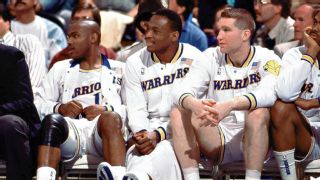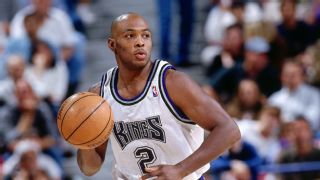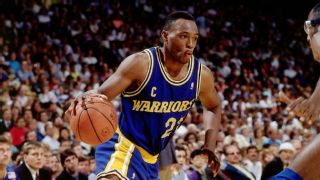|
The latch on the hotel room door in Denver was in place so Mitch Richmond could simply walk into his coach's suite. Richmond knocked anyway, entered the room and found Don Nelson sitting near a back window, on the air conditioning unit. Not much needed to be said. Nelson was the coach and general manager of the Golden State Warriors at the time, and although Richmond had won NBA Rookie of the Year and improved his scoring average each of the next two seasons, he had heard his name in trade rumors for some time. So when Richmond noticed his coach's somber demeanor, before the first game of the 1991-92 season, Richmond had only one question for his soon-to-be ex-coach. "I went in, and the only thing I asked him was, 'Just don't tell me you traded me to Sacramento,'" Richmond recalled just days before he's to be inducted into the Naismith Memorial Basketball Hall of Fame. "He put his head down and he said, 'Yeah, I traded you to Sac.' I said, 'Thank you, man. I appreciate it.'" Richmond was lying, of course. He was the middleman in Run TMC, the perfect fit beside Tim Hardaway and Chris Mullin. They had just created a league-wide buzz by reaching the second round of the 1991 playoffs with a high-octane, nearly unstoppable offensive approach. Richmond didn't appreciate being shipped 80 miles northeast, because it meant leaving a team with potential and going to a franchise that had averaged fewer than 28 wins a season since moving to Sacramento six seasons prior. As the basketball world prepares to celebrate Richmond's career on Friday in Springfield, Massachusetts -- a career so perfectly defined on many levels by his nickname, "Rock" -- that brief exchange with Nelson remains one of the most memorable and most influential. Because it altered his path. From then on, Richmond wasn't a unique, explosive talent on a quality team. From then on, even as he made six All-Star teams and even won an All-Star MVP award, Richmond was perceived as a guy who put up numbers on a bad team. Most called him underrated, but some considered him a stat collector. Either way, it's not the way a player of his talent and drive ever envisioned being recognized. For the final 11 years of his career, Richmond made just two playoff appearances, one series with the Kings in 1996, and as a reserve on the 2002 champion Lakers in his final season. Perhaps that's what makes Richmond's induction on Friday all the more impressive. Despite the sudden change of scenery, despite the lack of playoff success, despite constantly being surrounded by inexperienced teammates through seven years in Sacramento and another three in Washington, Richmond was widely recognized as one of the great shooting guards in an era when one particular shooting guard was seizing nearly every accolade for himself. "When you watch NBATV and those guys are talking and they ask, 'Who was the most underrated guard at the 2-guard spot?' They bring up my name. I felt like I was underrated a lot. No one kind of gave me the credit because I wasn't on these teams in the postseason. "It was so easy for me to play with Tim Hardaway and Chris Mullin, because every night I knew they were giving me 30 or 25 points a night. No one knew who to key in on. You know how hard it is every night when every team knows who's gonna get the ball? You think that's easier for me or harder? "So when I got the call that I was in the Hall of Fame, I was like, 'Man, you can't call me underrated anymore. I've risen. I'm there.' That call has erased all of the memories of the bad stuff that had happened in the NBA." Richmond's early memories, however, are quite fresh these days: from his time as a football-crazed youth growing up in Fort Lauderdale, Florida, moving from one area to the next to accommodate his single mother's career, to his experiences playing organized basketball for the first time in 10th grade, creating a friendship with another football-crazed South Floridian and eventual Hall of Famer, who was pretty good at basketball as well, Michael Irvin. "  Mitch was so unique, really the first practice, he seemed like he was a five-year veteran. ... He just came in and commanded respect all over the place. Mitch was so unique, really the first practice, he seemed like he was a five-year veteran. ... He just came in and commanded respect all over the place.
"-- Chris Mullin
By any reasonable standard, Richmond appeared poised to make the jump to Division I basketball after a stellar high school career at Boyd Anderson as an interior force with a decent outside touch. He had offers and even made a visit to Arkansas. The team the Razorbacks were playing that night was from Houston. But the group was better remembered as Phi Slama Jama. "And when I saw [Hakeem] Olajuwon and Clyde Drexler and Michael Young and Alvin Franklin, I was like, 'Ain't no way I could play down low in college.' "I mean, Olajuwon was a beast. It was like, 'Ain't no way.' I remember going to that game and saying, 'Man, I'm not ready for D-I ball right now,' not playing the 4-position, anyway." That's essentially what convinced Richmond to go the junior college route. He initially planned on playing at Westark Junior College in Arkansas, but ultimately decided to attend Moberly Junior College in Missouri after making an immediate connection with coach Dana Altman, who is now the Oregon Ducks head coach. At the time, junior college was loaded with eventual NBA talent such as Larry Johnson, Harvey Grant and Ledell Eackles. And Altman knew a 6-foot-5 Richmond wouldn't thrive if his shot didn't change. Richmond shot the ball from the side of his head, and Altman convinced him to center it, a move that truly rounded out Richmond's game. Together, Richmond and Altman went to Kansas State, where then-new head coach Lon Kruger promised to build his program around the Junior College All-American and added Altman to his staff. Two years later, Richmond had played for the U.S. in the World University Games, coached by Mike Krzyzewski, in the Seoul Olympics with the last U.S. team not to feature NBA players, coming home with a disappointing bronze (he redeemed himself with a gold in Atlanta in 1996), and was the No. 5 overall pick in the 1988 NBA draft. Eager to show his worth to the Warriors, an unsigned Richmond went directly from his Olympic experience to Oakland, wanting to scrimmage with a group of Warriors players and prospects. Turns out his first real meeting with Nelson wasn't much better than that one in the Denver hotel room. "I get to the gym, and I was just jet-lagged," Richmond said. "I mean, I was beat up, man. But I was playing, and I thought I played OK. And I can remember Nellie coming up to me and saying, 'Yo man, you terrible. Man, you need a lot of work.' "I'm like, 'First of all, I've been flying all day.' He just said, 'You were terrible. You're a long ways away.'" Apparently, Richmond didn't have that much to learn. Mullin was entering his fourth year at the time, and he saw Richmond's greatness from the first official practice. "Mitch was so unique, really the first practice, he seemed like he was a five-year veteran," Mullin said. "He had a post-up game, had a great jump shot, he was athletic, he was strong. That was different, having a guy walk in and being unquestionably the best player on the team on day one. "Mitch set the bar so high, as a rookie he averaged 22 a game, which is incredible. There was no grace period, no breaking in. He just came in and commanded respect all over the place."  The following season, when Hardaway came in as a rookie, the connection was immediate. "When Tim got there, we'd play one-on-one-on-one, full court with a weight vest on," Richmond said of the trio. "I mean, we were crazy. And Nellie would say, 'Get out the gym!'" The trio formed Run TMC, a play off the rap group Run DMC, a phenomenon so influential you'd think it lasted way longer than two seasons and one playoff run. "Mitch and I played three seasons together, a short amount," Mullin said. "And us three only played two seasons together. But the impact that it had on the court, the style of play, the excitement and all those things were way longer lasting. "And the best thing is our friendship. Over the long haul, it not only has remained intact, but we've gotten closer over the years." Which made the Nov. 1, 1991 trade to the Kings for the draft rights to Billy Owens so devastating for the three of them. Coming off a loss to the Lakers in the second round of the playoffs, the Warriors were considered an up-and-coming team. Nelson, though, wanted to add size, and Owens was three inches taller than Richmond. It also didn't help, in Richmond's opinion, that Richmond and the Warriors couldn't come to a contract extension agreement earlier in his Golden State tenure. Regardless of the reasons, the result was painful. "When he told us he got traded, I knew that was the beginning to the end," Hardaway said. "We were kind of upset, basically. We didn't show it, because we knew it was a business. But we didn't have time to grow as a team, didn't have time to develop as a team. I saw the future, and we could've been a team to reckon with for, shoot, a long time. "  I just started boohoo-ing, man. I called Bill Strickland, my agent, and I said, 'Man, what are the rules? Is there any way I can retire and come back to another team?' I just started boohoo-ing, man. I called Bill Strickland, my agent, and I said, 'Man, what are the rules? Is there any way I can retire and come back to another team?'
"-- Richmond on Kings trade
"We really had the Big Three." Richmond was so stunned, he couldn't even play for Sacramento the next day, in the Kings' second game of the season. That game also just happened to be in Oakland. Against the Warriors. "I remember Dick Motta came over to me and said, 'Hey, are you gonna play tonight, you gonna get dressed?'" Richmond said. "I'm like, 'Coach, honestly man, I don't even know where I'm at. I can't play tonight, man. I can't play against those guys right now. I'm tore up, man.' "He asked, 'Are you gonna sit on the bench?' I said, 'I'm going home, man.'" The drive home included a few minutes listening to the Kings-Warriors radio broadcast, but he couldn't withstand that for long. After aimlessly driving around for a while, Richmond made it home to his then-girlfriend, now-wife, Juli, and asked for the score in the contest that was nearly over. "She just put her head down," Richmond recalled. "I'm like, 'Yo, what's the score?' His new team had lost by 62 points, 153-91. "I just started crying, man," Richmond said. "I just started boohoo-ing, man. I called Bill Strickland, my agent, and I said, 'Man, what are the rules? Is there any way I can retire and come back to another team? What are the rules?' "I did not want to go to Sacramento." That wasn't the last time he cried as a King. The next morning, Richmond commuted to Sacramento for his first practice with the team, which he had believed to begin at 10 a.m. He arrived around 9:15. More than two hours later, still no one had showed up. "By 11:30, Randy Brown walks in and was with one of his buddies," Richmond said. "He comes in the locker room, and I said, 'Hey, what time is practice? I thought it was at 10 o'clock.' He said, 'Man, we got two days off.' "I'm like, 'What? You just lose by [62] points and we got [expletive] two days off?' I started crying again in the car. I'm like, 'Oh my god!' "Man, listen, I cried that whole year. That was a whole year of crying, brother." Crying off the court, but angry on it. Richmond said he played mad for quite a while, years even, wondering what he did to deserve being isolated as a star on a team constantly changing and loading up with youth that never truly had playoff potential. It actually took Richmond until his fourth year in Sacramento to finally leave Oakland -- he'd been commuting the hour-plus to remain closer to his ex-Warriors teammates and friends -- and move to Sacramento. Richmond likes to make it very clear he thoroughly appreciated his time with the Kings. He loved his teammates, his coaches, the fans and the city overall. But knowing nearly every year the discrepancy in talent and experience gave his team a limited shot at success was taxing. "All those other teams we were playing against, they were grown men," Richmond said. "You played against Portland, and Portland had Buck Williams, [Jerome] Kersey, Clyde Drexler, [Terry] Porter. "You just had so many teams equipped with grown men with beards and hairlines that went all the way back." Richmond's teams never even finished .500 in any of his seven seasons in Sacramento. But on one February night in Phoenix, Richmond, and by extension the Kings franchise, stood proudly at the center of the basketball universe. Richmond scored 23 points on 10-of-13 shooting for the victorious Western Conference in the 1995 All-Star Game, earning MVP honors. "I was just so happy to get that MVP, not only for myself, but for the city of Sacramento," Richmond said. "I will always praise the city of Sacramento and their fans because, even when I didn't want to be there, they still supported me. I mean, when I went there, that city, those fans were there every, every night. I think that was a big, big part of me getting up to play. "Because I would be down, and I would be griping and mad. But once I saw the crowd, I tried to block a lot of things out and just play hard." To those who knew Richmond, it felt like much-deserved, long-awaited recognition. "On that night," Mullin said, "he was the best player in the world." And now he'll forever be among the best who ever played. So it won't bother him if people try to discount his individual success because he was regularly on bad teams. It won't bother him if people dismiss his limited role with the 2002 champs. It won't even hurt as bad when he thinks about that meeting with Nelson in Denver. "The great thing is, Mitch went on to have a great career," Mullin said. "All those emotions never affected his approach, his discipline and his work ethic. That's what makes him who he is. "The most important thing is what your teammates and opponents say about you. I can't think of anyone that played with him or against him that wouldn't say the guy was one of the best 2-guards of his generation. That's why he's going where he is."
|


